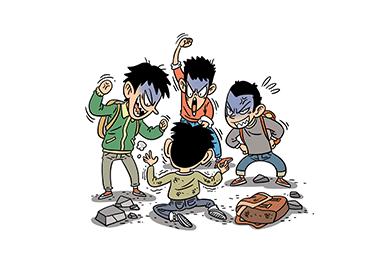Netizen Comments:
• Juvenile protection laws should protect the underaged, but not underage monsters.
• Young bullies across the country will be paying attention to the ruling. If these three young criminals are exonerated or given a lesser punishment, the sentence would encourage more school bullies to commit atrocities without fear of reprisal.
• The victim and three suspects in this case were left-behind children. Often neglected and lacking parental guidance, many left-behind children grow up in a harsh environment governed by survival of the fittest, leading them to believe that violence is the only answer. This cycle of tragedy won’t stop if society overlooks the plight of left-behind children.
Source: Zhihu
Expert Comments:
• Wang Zhenhui, professor at the Procedural Law Research Institute, China University of Political Science and Law: “Facing such a high-profile murder case, the Supreme People’s Procuratorate eventually agreed to prosecute the suspects. This sends a clear message to society that being underage is not a get-out-of-jail-free card for offenders of major crimes.”
Source: The Procuratorate Daily
• Che Hao, deputy dean of the Peking University School of Law: “In terms of juvenile justice, China has long insisted that education is more important than punishment. In judicial practice, we must not stray from this fundamental principle solely based on a few extreme cases. If severe punishment for juvenile delinquents takes precedence in juvenile justice, it could lead down a misguided path.”
Source: The Procuratorate Daily
• Zhu Guangxing, associate professor at the School of Criminal Justice, China University of Political Science and Law: “This case serves as a wake-up call for schools, parents and society to enhance legal and social awareness among minors. While the law plays a role in social management, it is not the most important one. There is a compelling need to holistically and systematically care for, protect and effectively educate the country’s teenagers and youth.”
Source: The Beijing News
A shocking teen murder case in northern China has ignited nationwide discussions over juvenile delinquency in the countryside and how it is dealt with in the justice system.
On March 10, three teenagers brutally murdered their 13-year-old classmate and buried his body in an abandoned greenhouse in the rural outskirts of Handan, Hebei Province. When his corpse was found, the victim’s face, head and back were severely disfigured by the spade used to bury him, media reported. According to authorities, the trio began digging the victim’s grave a day before the murder, indicating it was premeditated. The three were detained on March 11.
The victim, identified as Wang, had reportedly been the target of prolonged bullying by the three offenders. All four boys involved are “left-behind children,” a term used to describe children left in the care of relatives in their rural hometowns while their parent or parents work in urban areas. The three attackers are all under 14.
Following a change in legislation in 2021 that lowered the minimum age for criminal responsibility from 14 to 12, the Supreme People’s Procuratorate, China’s top prosecution authority, granted approval for the juveniles’ prosecution on April 8. Wang’s tragic case is the first to be tried under the new legislation.
The harrowing nature of the crime triggered outrage on social media since the news broke on March 11. Many have called for the death penalty, emphasizing the need to take a tough stance against juvenile crime to ensure a safer environment for minors. Others said that lenient punishments for such brutal acts could potentially encourage further criminal behavior and inspire copycat incidents.
Experts stressed the importance of addressing the root causes of juvenile delinquency through active involvement from families, schools and society, in addition to legal regulations and punishment.
Both experts and netizens have stressed the significance of prioritizing the mental well-being of left-behind children, advocating for increased attention from both society and families to safeguard vulnerable youth.

 Old Version
Old Version